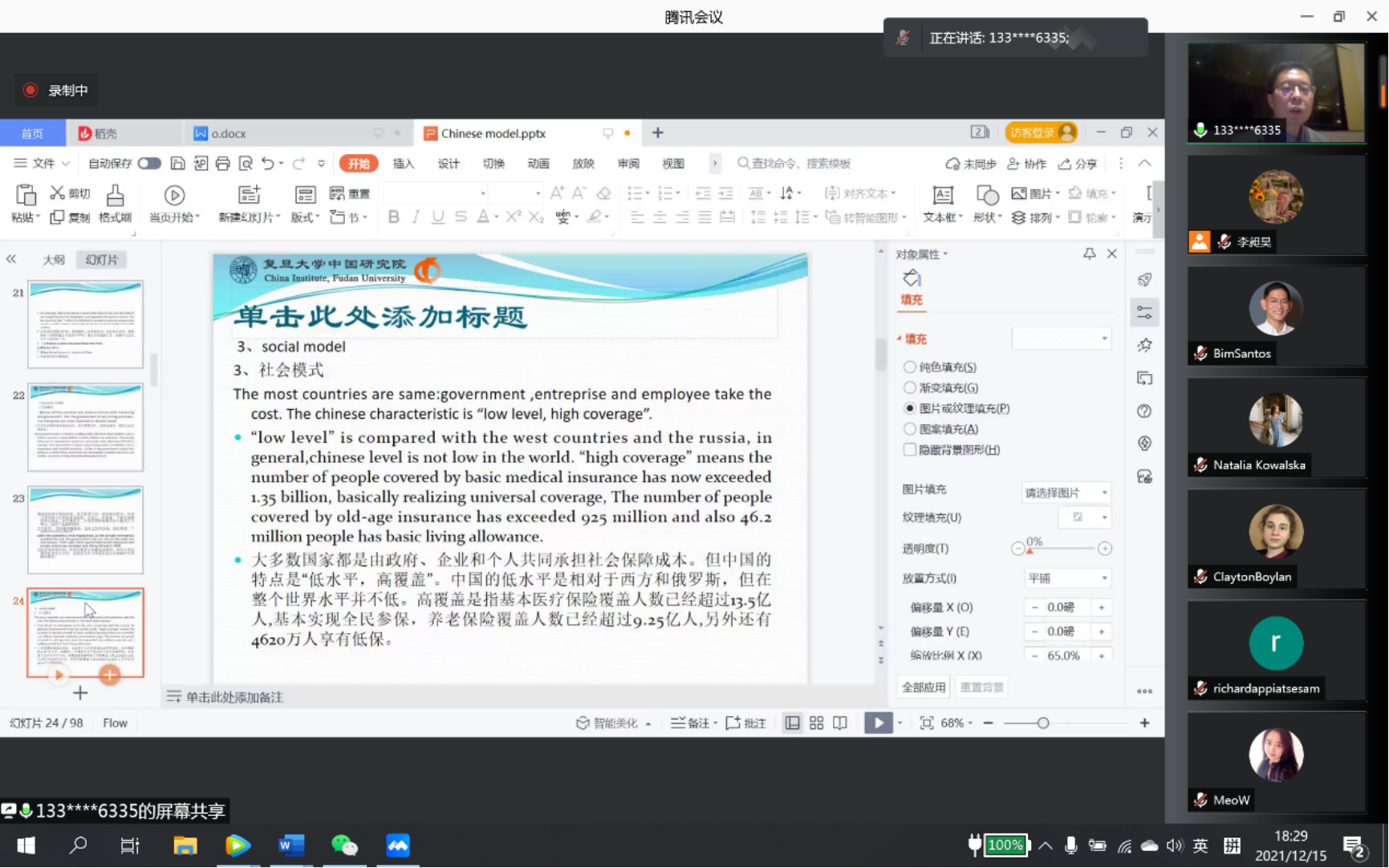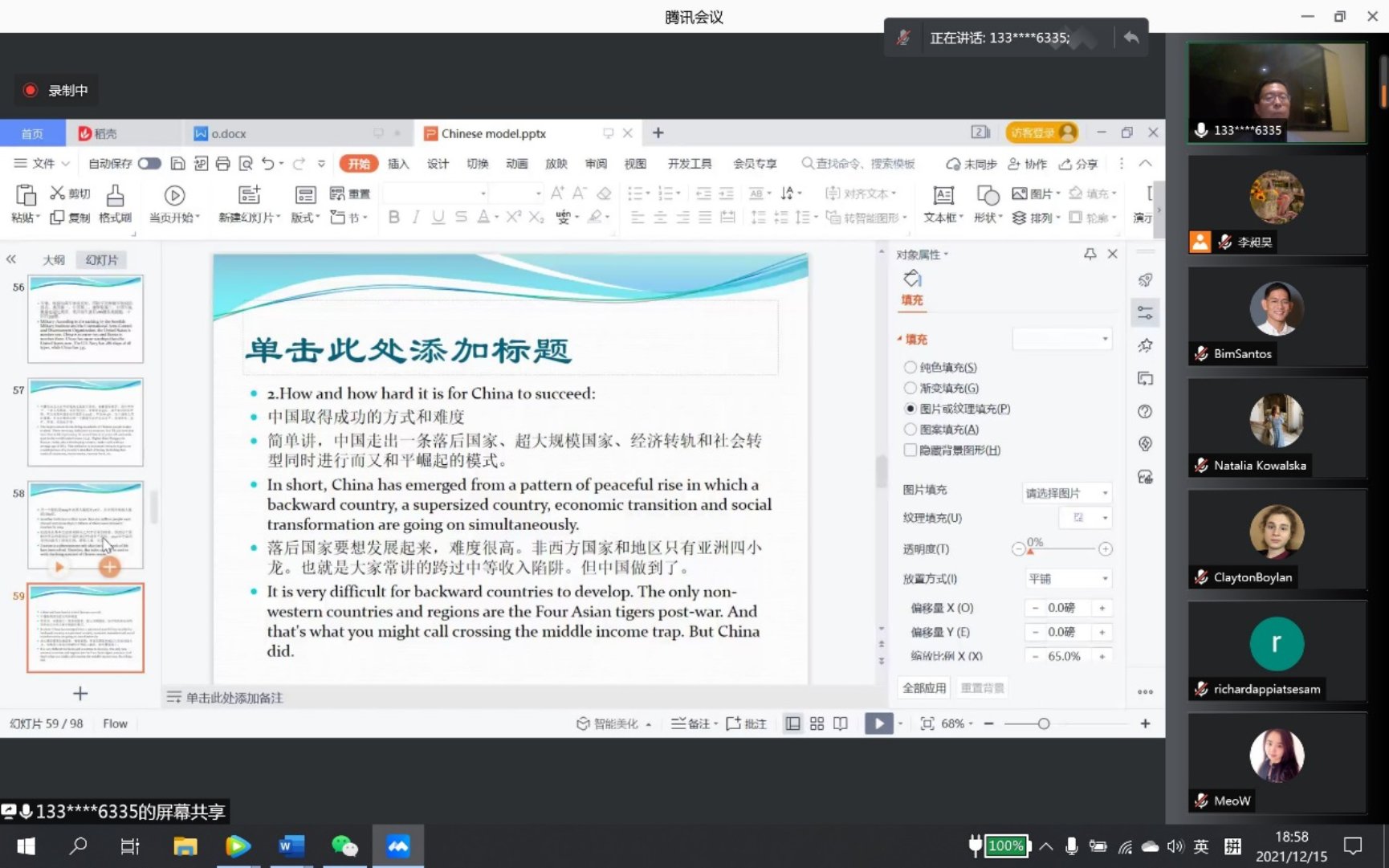Forum
Lecture——The Chinese model
Author:Ekaterina Prodanova|SRS 2021
Editor: Aneka Rebecca Rajbhandari|SRS 2021
On December 15, the first-year students of the Master of Contemporary Chinese Studies program of Silk Road School attended another seminar on the Chinese political model delivered by Professor Song Luzheng from the China Institute, Fudan University. Professor Song covered a wide agenda comparing two political systems: the western democracy and the “Chinese model”.

The students found this topic extremely relevant, as the professor shed light upon the Chinese evaluation of the democratic political system, as a Nepali student Sunraker Gyatso Karki commented afterwards: “Today’s seminar was really interesting because it covered a lot of topics, from both Western and Chinese perspectives. I liked the way the professor used historical and present examples to explain his views on aspects like democracy and human rights. He clearly explained the pros and cons of democratic rule in Europe and the unique nature of China’s system. I also liked that his views on Europe were based on actually living there.”
Professor Song has a valuable background of studying and living in France and is connected to the European school of thought. During the lecture he used strong arguments based on facts, supporting his main idea of the one-party political model being the most suitable for China, guaranteeing the further continuation of successful development to the country in the future. The Chinese economic miracle is rooted deeply in the political system that provides both stability, in contrast to the western democracies, and flexibility, unlike the governments of many Central Asian countries.An MCCS student from Mongolia, Batzorig Zorigo summed up this point: “One of the valuable things I understood from the seminar is that China’s political system and mechanism is highly focused on efficiency and inclusion in the light of harmony. In comparison with western countries, China does not shape its policies in the name of any solid theory or lopsided notions like democracy does, but it respects flexibility and stability in all levels. So, this seminar helped me understand the core and simple secret of today’s successful China.”
In his presentation, Professor Song talked about the culture as the mother of institutes. He mentioned three main traditions of Chinese political culture: first being people-oriented, not ruler-centrist; second being practical and focuses on problem solving; the third tradition is meritocratic talent selection, as opposed to the kinship-based selection. As far as the Chinese model itself was concerned, Professor Song stated four aspects as its foundation: single political centre, elites selection based on their long-time performance, tenure system and age limited system. A student from Costa Rica, Jose Ricardo Vargas Rojas, paid attention to this description and offered his own interpretation: “To have their leader chosen considering experience in their field at various levels and not popularity, unlike us Westerners do, shows firmness and fortitude from the long-term approach to life of the Eastern side of the world. To remain thinking short-term will cost the West their spot as world economic potency anytime soon.”
The professor also identified weakeness of western democracy as observed from the outside and recognized the built-in disadvantages that make the democratic system inadvisable in the realia of modern day China. The most convincing argument in support of this position is that the Chinese model of governance has proven effective in such critical situations in history like the financial crisis of 2008 and the global pandemic of 2019, while the western democracies demonstrated their shortcomings. However, Professor Song put an extra emphasis on the notion that China does not wish to export its political system and is not looking to become a model for other countries, as each government needs to find its own way that would work in the given circumstances.
A student from Nigeria, Chinazam Okorie, shared her opinion on the seminar: “It was an enlightening and eye-opening experience. Before now, I had imagined the Western model of political systems as being the best and only way to achieve social order and development. However, this lecture opened my mind to more than one way of achieving the same goal.
Unlike the Western democratic style which places procedure over results, the Chinese system values results over procedure; placing emphasis on the people and the state with the ruler being the least important.
Also, this lecture reveals a flaw in Western systems of democracy which often places absolute power with the citizens to decide their public goods/value: the 'Brexit' example has clearly shown that the citizens are not always perfectly capable of deciding the best public value.

So far, the Chinese model which allows the ruling party leverage to make important decisions on behalf of the people has proved potent in delivering dividends of economic and social stability and should be used more as case study by developing countries especially in Asia and the Pacific.”
The lecture was indeed very thought-provoking, and students were eager to interact with the professor after the lecture. They were interested in the professor’s opinion on the issues of human rights, freedom of speech and mass migration. For majority of the student audience the seminar opened a new perspective on Chinese politics, as they had a chance to make a solid comparison of the Chinese and western narratives, forming a better and balancedunderstanding of the world political system as a whole.

